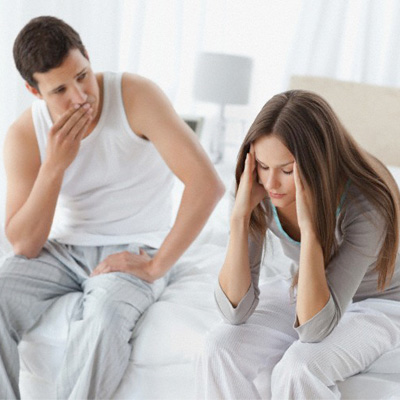
Libido has been described as an individual's sexual desire or drive for sexual activity with partners. In modern medical terms, libido refers to the person's overall sexual desire or urge for sex. Libido can be affected by physiological, psychological, social, and cultural factors.
Biologically, sex hormones, such as testosterone and estrogen, which are produced in the adrenal glands, regulate human sexuality. When the levels of sex hormones in the body decrease, sex drive decreases and sexual desire decreases, with the opposite effect when the levels increase.
The hormonal level of a woman's body also plays a role in the desire for sex
Women who suffer from infertility and lack of hormones will have lower sex drives than women with normal hormonal levels.
The male and female reproductive systems also affect a woman's libido. Sex hormones such as testosterone can increase the production of testosterone by the testes; in turn, this can stimulate the production of the female sex hormone estrogen.
In addition to these hormonal and physiological effects on libido, psychological factors can also have a great impact. Some people find that certain thoughts and feelings to help them enjoy their sexual activities, such as having a sexual fantasy. Other people may find that being sexually active with partners causes negative feelings.
If a partner seems to be having problems in the bedroom, they may be experiencing relationship problems. A partner's sexual dysfunction may be caused by emotional or mental stress, or physical pain from past sexual encounters or from not using lubricants.

It is important to talk to your doctor if you have any symptoms or signs that might indicate a problem in your person's libido. Some signs to watch for include vaginal discharge, itching and/or burning, vaginal odor, or pain during intercourse. Other signs to look out for include unexplained fatigue, changes in your menstrual cycles, increased or decreased appetite, or fatigue, muscle pain and tenderness, or tingling sensations, or a burning, and sexual dysfunctions such as painful ejaculation.
With the right tests and examinations by your doctor, a medical professional in your doctor's office can help determine if there are underlying issues or cause for the decreased libido. This will help your doctor make the proper treatment for your condition.
Your female reproductive system has many different parts, all of which may affect your libido
The female reproductive system is made up of two parts, ovaries and fallopian tubes. There are several other parts, including the cervix, uterus, fallopian tubes, ovaries, vagina, urethra, and clitoris.
Ovaries: The ovaries produce an egg which is then deposited into the womb. In some cases, an ovule may be expelled during a period, but in others, the ovule remains in the ovary where it may produce a viable egg and fallopian tube and fallopian tubes may become damaged, causing the egg to fall out and travel through the fallopian tubes.
Fallopian tubes: The fallopian tubes connect the ovaries to the uterus and through which the egg travels to the uterus. When a fertilized egg is fertilized, it will travel through the fallopian tubes and fallopian tube to the uterus where it becomes pregnant. In some women, the fallopian tubes may become damaged and blocked, resulting in difficulty in ovulation, leading to a lack of periods.
Ovaries produce the egg that fertilizes the sperm and that egg becomes an embryo. At this point, the embryos are called zygotes, or germ cells. Once in the uterus, the zygote moves through the cervix to the uterus and attaches itself to the uterine wall where it begins to develop.
oocytes: The oocytes produce the female sex hormone called female sex hormones. They are responsible for stimulating sexual intercourse and fertility. When the female sex hormones become in balance, they become a viable egg and start to multiply into a developing fetus, which starts to mature and develop as a baby.